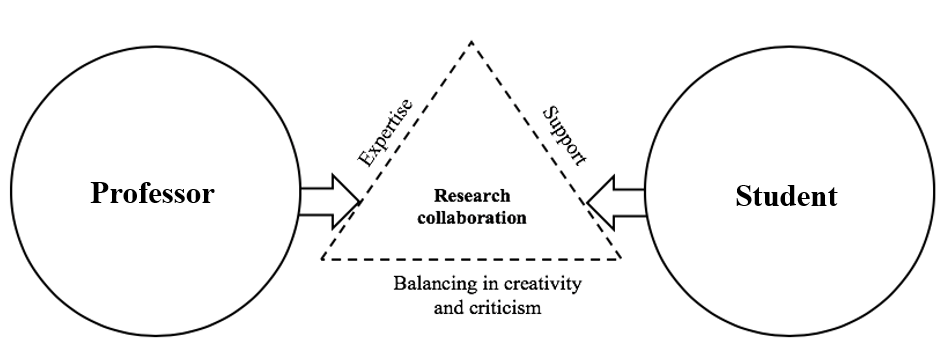“A challenge facing scientific research is establishing and forging a healthy relationship between the research supervisor professor and the student for better learning outcomes.”

This is a popular article made in collaboration with Tecnológico de Monterrey’s Writing Lab.
The number of scientific publications in universities helps improve the national and international classification of higher education institutions, attracting more local and international students. Each year, many graduate students try their luck applying to research-focused international institutes in the hope of obtaining better-paying jobs. However, one of the challenges in research development is to achieve effective collaboration between professors and graduate students, which would result in better learning outcomes. In this article, I present a brief overview of the study that we conducted.
Academic doctoral programs at universities have particular challenges; for example, expert professors who oversee scientific research are costly and not readily available. Therefore, a common practice is assigning cheaper research associates or part-time professors; however, they are not fully committed to overseeing an investigation. This type of action reflects a lack of support for scientific development in higher education institutions.
“The professor not only helps students choose their research topic but also provides them with moral support. That moral impulse helps students gain confidence in academic matters, which leads to good results.”
Another challenge facing scientific research is establishing and forging a healthy relationship between the supervising professor of research and the student. This relationship should be based on research work that is beneficial for both, so the professor must play the role of leader, guide, and role model. Therefore, graduate students should consider three elements when choosing a research supervisor:
-
They have research area experience.
-
They provide financial support to the student in recognition of their work.
-
They seek a balance between creativity and criticism.
Some Ph.D. students have had to interrupt or drop out of their studies due to a supervisor’s poor choice, as was the case of an international student from East Asia, who shared his experience. “After investing more than a year in his Ph.D., he had to interrupt it due to the lack of experience and little or no contribution from his research supervisor.” This experience shows the importance of carefully selecting the professor who will accompany you throughout your research work. Therefore, an ideal research supervisor should balance the university’s capabilities and strengths while observing the limitations of the experience between the student and the teacher [1].
At Tecnologico de Monterrey, we conducted an exploratory study on research collaboration between professors and students at the university level to improve academic writing, research publishing skills in high-impact journals, and time management. An evidence-based study of literature helps develop new ideas and explore new areas of research [2]. To this end, we did a literature review to explore and connect professors’ and students’ participation mechanisms. Through evidence collected in published literature and research collaborations, we found that students have discerned three essential factors to seek in supervisors.
Elements involved during the professor-student research collaboration for better learning outcomes
Interaction between professors and students is vital for better research outcomes. The professor’s experience in the field is also essential. The professor not only helps students choose their research topic but also provides them with moral support. That moral impulse helps students gain confidence in academic matters, which leads to good results. The professor rewards students’ hard work and frees them from financial problems. Some institutions award graduate scholarships. Faculty members are responsible for advising students during the scholarship application phase, in which students must pass a course to receive this support. You can read the entire research work here.
The following are three characteristics that students should seek in a supervising research professor: research experience, financial support to the student, a balance between creativity and criticism [1].
-
Have experience in the area of research
During research studies, some international students have experienced weak collaboration with their teachers (mentors) due to their lack of communication skills [3]. There is a special requirement for professors to possess the basic knowledge to attend problems such as poverty, family history, and communication gaps with doctoral candidates. Therefore, development and educational programs have been established to improve professors’ skills. A semester assessment by students of their professors is also applied to review their professors’ opinions and propose professional training programs.
-
Provide financial support to the student in recognition of their work
The setting of objectives and the research scope within an agreed timeframe is a doctoral student’s competency that affects their research achievements. Students are also expected to consider the time frame they have to complete specific assignments. Professors and students should maintain a healthy relationship to avoid disagreements in research collaboration and combat collaboration problems caused by lack of skills. Healthy leadership and experienced professor guidance in selecting research topics help students overcome problems that arise. These actions help students from economic, social, and academic points of view [4].
-
Find the balance between creativity and criticism
A supervising research professor must be innovative and possess critical elements to manage and balance situations efficiently, including proposing creative learning opportunities for students, attending seminars, research activities, and meetings with the right people. Academicians believe that professors should promote teaching rules and guidelines that motivate students to participate actively in class to perform better in the course [5]. The professors need to know how to balance creativity and criticism during the research collaboration with the students. Also, the teaching methods, quality of interactions, and frequent meetings are drivers for Ph.D. students to achieve better academic outcomes. Positive criticism is considered another agent that improves the work quality and research skills of students.
Figure 1. Theoretical research model by Asad Abbas (2020).
Research method
For this investigation, a literature review was conducted based on articles published about professor-student collaboration in higher education. The goal was to identify a gap within the literature and develop strategies to improve collaboration between professors and students to achieve better research results. University databases such as Web of Science were used to access research articles from 2016 to May 2020, using search terms such as “Professor-Student,” “Research Collaboration,” “Relationship,” and “Higher Education.” The keywords were derived from the research topic before doing the research and after the selection. Diverse articles from the Web of Science database were consulted, combining keywords. Articles from journals and conference proceedings were also included in this study.
Final observations
The professor-student academic relationship is mainly based on their research collaboration. Students are expected to rely on the professor’s experience, support, criticism, and creativity. Even today, using an ICT-based online assessment system, students consider the experience, academic skills, and leadership of the professor to be driving forces. Under the direction of faculty members, when students receive financial support as compensation for participating in their programs, they feel motivated to collaborate and achieve more outstanding results. Students can also improve their learning skills if professors establish an environment that balances creativity and criticism. The professors can monitor their reviews and use their management and balancing skills to avoid potential conflicts. All of these elements clear the path to academic achievement and successful research careers for the students.
This article is an adaptation of the 2020 IEEE Frontiers in Education Conference (FIE) publication. DOI 10.1109/FIE44824.2020.9273902
About the author
Asad Abbas (asad.abbas@tec.mx) is a full-time mentor in the Writing Lab at the Institute for the Future of Technological Education at Tecnologico de Monterrey, Campus Monterrey, in Mexico. He received his Ph.D. in Management Sciences in Public Administration from the University of Science and Technology of China (USTC) in Hefei, People’s Republic of China. He earned his master’s degree in Informatics from the Örebro University, Sweden. His current research focuses on innovation management, technology policy, research ethics, and higher education.
References
[1] R. Fraser and A. Mathews, “An evaluation of the desirable characteristics of a supervisor,” Australian Universities Review, vol. 42, no. 1, pp. 5-7, 1999.
[2] Y. Li, “Publish SCI papers or no degree: Practices of Chinese doctoral supervisors in response to the publication pressure on science students,” Asia Pacific Journal of Education, vol. 36, no. 4, pp. 545-558, 2016.
[3] A. Abbas, A. Arruna-Palacios and H. Haruna, and D. Alvarez-Sosa, “Elements of students’ expectation towards teacher-student research collaboration in higher education,” in 2020 IEEE Frontiers in Education Conference (FIE), Uppsala, Sweden, 2020.
[4] R. F. F. Fernandez, “Towards enhanced output: An approach to remedial teaching,” in 6th Annual International Conference on Cognitive – Social, and Behavioural Sciences (ICCSBS), Porto, Portugal, 2017.
[5] V. Johnston, K. Way, M. H. Long, M. Wyatt, L. Gibson, and W. S. Shaw, “Supervisor competencies for supporting the return to work: a mixed-methods study,” Journal of Occupational Rehabilitation, vol. 25, no. 1, pp. 3-17, 2015.
[6] J. Brophy, “Teacher praise: A functional analysis,” Review of Educational Research, vol. 51, no. 1, pp. 5-32, 1981.
Edited by Rubí Román (rubi.roman@tec.mx) – Observatory of Educational Innovation.
Translation by Daniel Wetta.
About Writing Lab
The Writing Lab is a TecLabs initiative dedicated to the development of the culture of research in educational innovation and the improvement of the academic production of the teaching community at Tecnológico de Monterrey.
Financing and technical support are provided only for Tec de Monterrey’s professors to attend conferences or publish articles in journals.
For more information visit: https://writinglab-tec.com/
Facebook: http://facebook.com/WritingLabTEC
Twitter: @TecWriting
Instagram: instagram.com/writinglabtec/
This article from Observatory of the Institute for the Future of Education may be shared under the terms of the license CC BY-NC-SA 4.0 
)
)



)